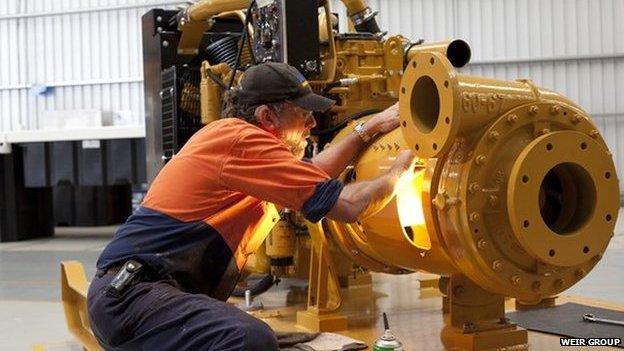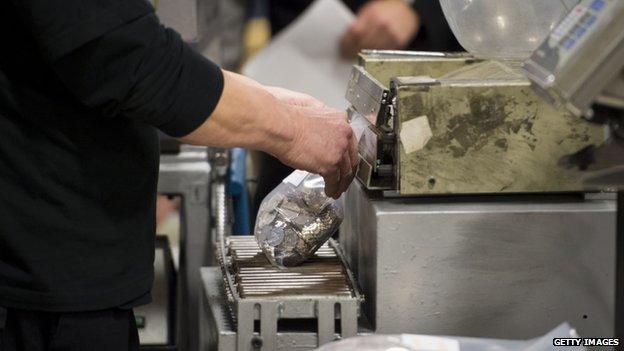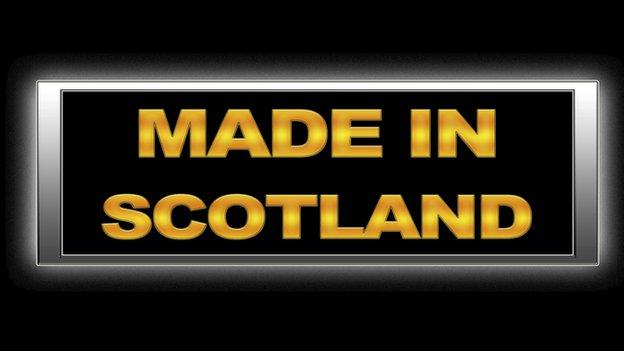Scottish independence: 'Yes' vote carries substantial risk, says Weir Group
- Published

Weir employs 15,000 people across the world, including 600 in Scotland
Scottish independence would carry "substantial risks" to the economy, the boss of one of Scotland's biggest companies has claimed.
Weir Group chief executive Keith Cochrane said the "quality of life of millions of people" was at stake.
His comments came as a report for the engineering giant said a referendum "Yes" vote would create costs and uncertainties for business.
Scottish ministers said Weir was showing "no uncertainty" as a company.
The Weir Group, one of Scotland's oldest firms, was founded in 1871 and is based in Glasgow, with 15,000 staff working in the minerals, oil and gas, and power sectors in more than 70 countries.
Keith Cochrane: "As regards the location question, frankly it it too early to call at this point because there is so much uncertainty."
It employs 600 people in Scotland.
An 80-page document, compiled by Oxford Economics, external for Weir Group said higher taxes for Scottish firms would be likely if there were a "Yes" vote in the 18 September independence referendum.
Speaking as he launched the report, Mr Cochrane said the debate on Scotland's future had so far been characterised by "claim and counter claim, not a clear examination of the facts".
Referring to the Scottish government's blueprint for independence, he said: "Unsurprisingly, as a political document, the Scottish government's White Paper paints a picture of independence as being a risk-free option with only potential benefits.
"However, voters should be aware that what they are being asked to say 'Yes' to carries substantial risks to our economy and therefore to the quality of life of millions of people."
Mr Cochrane, who said he would personally be voting "No" in the referendum, said there were "benefits" in an independent Scotland being able to do things differently from the rest of the UK, but said that status meant "additional costs for companies that operate across these islands".
Responding to the report, Scottish Finance Secretary John Swinney said: "International comparisons show that independent countries of Scotland's size have considerably larger manufacturing sectors than the UK and are able to offer more support to their manufacturing companies than Scotland is currently able to do."
He added: "On the issues in this report, there is no doubt that an agreement on pensions can be reached in just the same way as has been achieved in Ireland and exactly as proposed in our white paper. That agreement will be reached precisely because cross border pensions affects companies in both Scotland and the rest of the UK."
Alistair Darling, leader of the Better Together campaign and the former UK chancellor, said: "This is an important evidence based report from another large employer in Scotland, which makes the positive case for Scotland remaining in the UK.
"Yet again, it is clear from a company employing hundreds of Scots that being part of the UK is good for jobs here and it keeps down costs for families in Scotland."

The Oxford Economics paper, external focussed on several key areas - funding costs, taxation, trade and pensions.
Funding and currency

Mr Cochrane said the Oxford analysis suggested an independent Scotland would pay more to borrow than the UK currently does, because a nation "with no official credit history will be treated more cautiously than one with a 300-year record of meeting its loan repayments".
He said extra costs could add 1% to the interest rate, meaning an additional £10m in annual interest repayments for every £1bn of borrowing.
"That's tens of millions of pounds annually which would no longer be available to build schools, repair roads or make the country more competitive," said the Weir chief.
The Scottish government has insisted an independent Scotland would negotiate to keep the pound under a formal currency union with the of the United Kingdom.
That scenario has been ruled out by the Conservatives, Labour and the Liberal Democrats - although their stance has been challenged by an unnamed UK government minister quoted by the Guardian as saying "of course there would be a currency union".
The Oxford Economics paper said a new currency could cost Scottish-based businesses £500m a year in transaction costs, in addition to one-off transition costs of around £800m.
It added that whatever currency regime was adopted would likely bring "significant constraints for Scottish public spending".
The report also estimated that cutting the country's level of public debt to 60% of GDP over the first 10 years of independence would require spending cuts or tax rises of around £9bn from 2016-17, which "would represent a fiscal tightening of the same order as that already undertaken by the UK government during the 2010 to 2015 parliament."
Other concerns included lower prospective revenues from the North Sea and a population growing less rapidly and ageing more quickly than in the rest of the UK.
Business tax

Mr Cochrane said the Scottish government's plan for a 3% corporation tax cut under independence was welcome, but "in isolation is too simplistic".
He said Weir's Scottish operations ran at a loss, but there was the option to offset losses in one part of the company with profits made in another.
The Weir boss said: "It's a system called 'group relief' and is far more valuable to a company like Weir than a three pence cut in corporation tax - but 'group relief' couldn't survive independence because the current UK tax arrangements would no longer exist."
Mr Cochrane said the government's tax cut policy would save Weir about £400,000, while the flexibility offered by 'group relief' was "worth almost nine times that figure".
The Oxford analysis recognised flexibility to tailor tax rates as "a significant attraction of Scottish independence in principle", but said the government's estimate that the policy would generate 27,000 jobs "is probably over-optimistic".
Trade

Oxford Economics said they assumed an independent Scotland would be admitted to the European Union, which "would ensure continued free trade with rUK and other EU partners".
But it said the introduction of a new border could have "a number of negative impacts on Scottish exports, especially since 70% of Scottish non-oil exports go to rUK, accounting for nearly a third of overall Scottish GDP".
This would be most acute in the financial services sector which might come under pressure to relocate some operations out of Scotland, according to the report.
But "an independent Scotland that delivered an attractive business environment, a favourable tax regime, and easy availability of high-quality skills could be attractive to firms for whom UK markets are less important than international sales," such as "machinery & equipment and computers and electronics".
Private Pensions

Mr Cochrane said this was an area where "additional costs look very substantial".
He said Scottish independence would mean The Weir Group being faced with the choice of "breaking up" the company's current UK-wide scheme, or paying off its deficit - currently £60m - more quickly.
The Oxford report suggested higher borrowing costs for an independent Scotland (in other words, higher yields on sovereign debt) should lead to higher annuity rates, and a reduction in the deficits of Scottish defined-benefit schemes, creating "a windfall for Scottish businesses."
But there would be, it said, "a new layer of cost and complexity" for businesses providing pensions for employees on both sides of the border who would have to deal with "separate regulators and potentially with two different pension protection funds," as well as facing the risk of a Scottish protection fund being "more easily swamped by a single large pension fund insolvency."